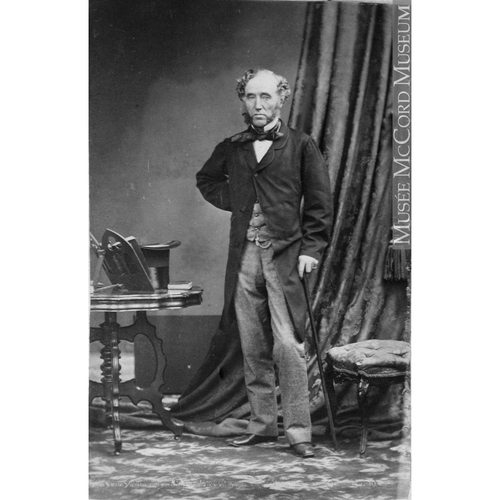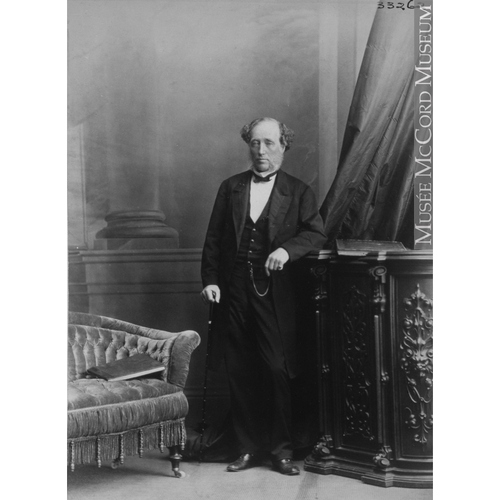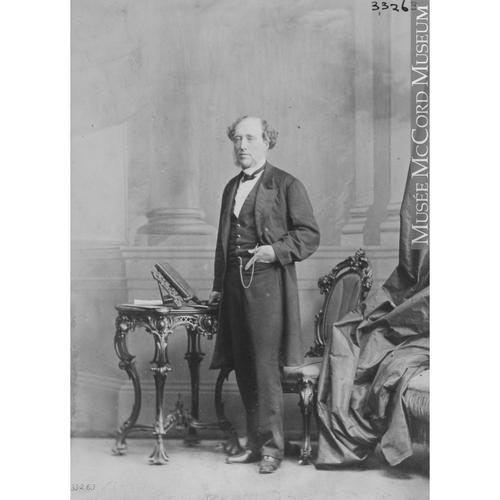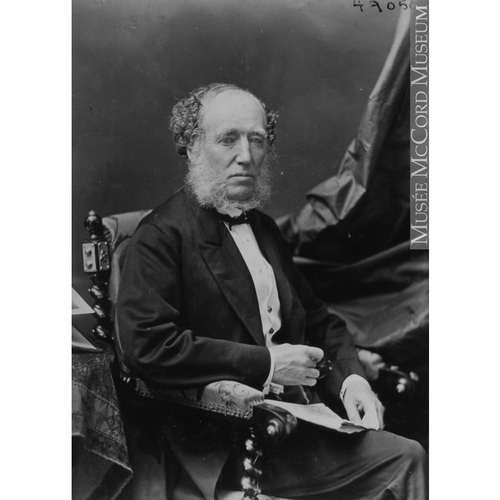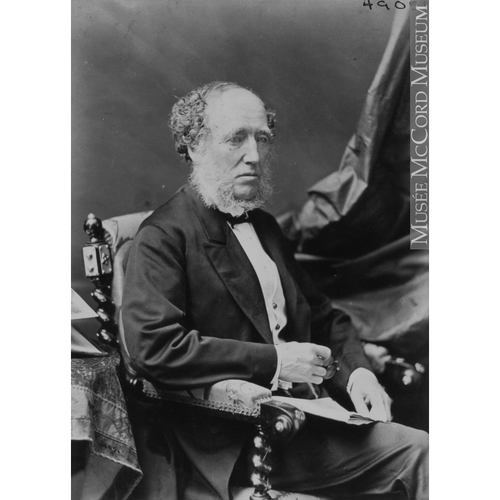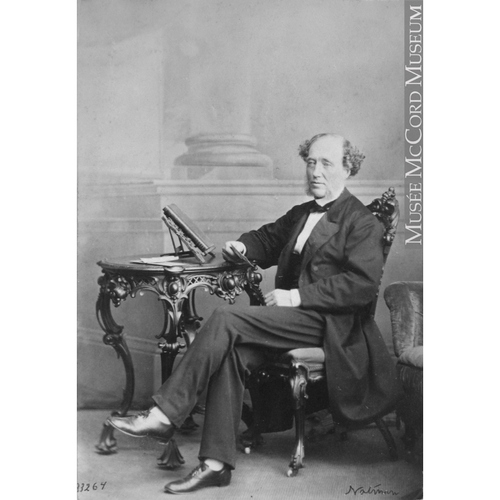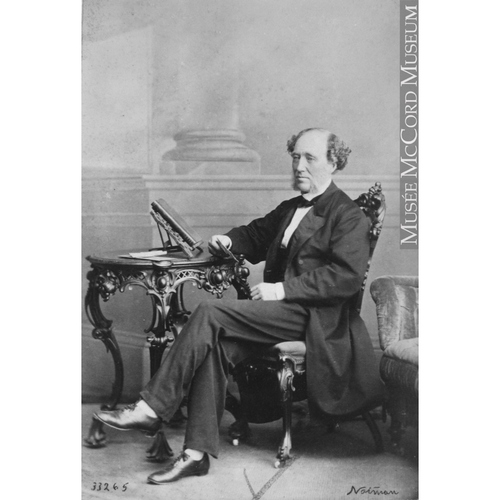BAYARD, WILLIAM, physician, surgeon, and author; b. 21 Aug. 1814 in Kentville, N.S., son of Dr Robert Bayard* and Frances Catherine Robertson; m. 11 July 1843 Susan Maria Wilson of Chamcook, N.B.; they had no children; d. 17 Dec. 1907 in Saint John, N.B.
William Bayard was one of the most distinguished physicians in New Brunswick for much of the later 19th century. Born of a Huguenot family, he was educated at Fordham (New York City) and received his medical training in New York State and at the University of Edinburgh, where he was awarded an md in 1837. (An lld would be conferred on him in 1907.) He then joined his father in Saint John, and assumed the practice upon the latter’s death in 1868. In 1839 he became coroner of Saint John, a position he would hold for 30 years. An Anglican in religion, he was a Conservative in politics. In 1896 he would serve as president of the New Brunswick Loyalist Society.
Bayard was an active member of the New Brunswick medical community. From 1863 to 1903 he held the chair of the board of commissioners of the Saint John General Public Hospital, an institution that owed its existence to his efforts, efforts which included the authorship of a controversial poll tax to construct and maintain the hospital. He also served as chairman of the board of health for the city and county of Saint John (1855–87) and of the Provincial Board of Health (1887–1903). He was president of the New Brunswick Medical Society (1867–71, 1880–81, 1890–91, 1899–1900), the Council of Physicians and Surgeons of New Brunswick (1881–85), the Maritime Medical Association (1891), and the Canadian Medical Association (1894–95). Although he had not been present at the organizing meeting of the CMA in 1867, he had nevertheless been appointed to three of its seven committees and had been made chair of the one on medical education. In 1891 he was New Brunswick’s delegate to the International Congress of Hygiene and Demography, held in London.
In his choice of therapeutics, Bayard was representative of the Anglo-American medical community. Although he boasted of an acquaintance with Joseph Lister, his understanding of the germ theory was confined to the operating-room and to the liberal use of carbolic acid. Bayard was rather an adherent of the miasmatic (foul-air) theory, a competing explanation of the cause of disease. For the germ theorist, deadly micro-organisms which flourished in filthy slum conditions brought disease; for the miasmatic theorist, the slums themselves were responsible for sickness. While the distinction appeared small, proponents of the miasmatic theory tended to be more active in ameliorating the living conditions of the poor in the name of public health. Bayard was concerned with the level of proper ventilation, measured in “cubic feet per hour,” necessary for good health. Fetid smells, particularly from sewage, were, to Bayard, indicative of enteric fever and other diseases which arose through the medium of the air to attack their victims.
Bayard’s most influential publication was An address upon the use and abuse of alcoholic drinks, an anti-prohibition tract. Like many of his professional contemporaries, he considered the judicious use of alcohol to be “a most valuable remedy in various forms of disease, and one for which no proper substitute has yet been found.” “Alcoholic stimulants improve the appetite, assist digestion, and in fevers and other wasting diseases, are indispensable.” Bayard did believe, however, that those who abused alcohol regularly should be locked up. Voluntary inebriates – that is, those who still possessed “the power to resist” alcohol – should be imprisoned with hard labour; involuntary drunkards (confirmed alcoholics) should be restrained in institutions until such time as they were cured. In Bayard’s commonsensical view, prompted no doubt by the total failure of temperance measures in Saint John, the sale of alcoholic beverages ought to be licensed, not prohibited: “The efforts of the philanthropist should be directed towards the possible, not the impossible.”
In his numerous papers on the progress of medicine over the centuries, Bayard’s favourite quotation was that ascribed to “Dr. Letsom” of 1783 London:
When patients comes to I,
I physics, bleeds and sweats ’em,
And if they choose to die,
What’s that to I, I lets ’em.
William Bayard is the author of the following publications: Address upon the progress of medical science, read before the New Brunswick Medical Society (Saint John, N.B., 1871); An address upon the use and abuse of alcoholic drinks ([Saint John?, 1882]); An address upon the progress of medicine, surgery and hygiene, during the last 100 years, delivered by request at the St. John Mechanics’ Institute, on Feb. 4th, 1884 ([Saint John?, 1884?]); An address delivered at the opening of the training school for nurses, at the General Public Hospital in St. John, on October 4th, 1888 ([Saint John, 1888?]); Presidential address at the meeting of the Maritime Medical Association, held in St. John, N.B., July 22nd and 23rd, 1891 ([Saint John?, 1891?]); and History of the General Public Hospital in the city of Saint John, N.B. ([Saint John], 1896).
Saint John Globe, 18 Dec. 1907. Biog. rev. of N.B. (Jack). Canada Lancet, 41 (1907–8): 475. Canadian album (Cochrane and Hopkins). Canadian biog. dict. Canadian men and women of the time (Morgan; 1898). Cyclopædia of Canadian biog. (Rose and Charlesworth). The development of public health in Canada . . . , [ed. R. D. Defries] (Toronto, 1940). H. E. MacDermot, History of the Canadian Medical Association (2v., Toronto, 1935–58). Vital statistics from N.B. newspapers, 1842–45; 1868–69 (Johnson).
Cite This Article
Cheryl Krasnick Warsh, “BAYARD, WILLIAM,” in Dictionary of Canadian Biography, vol. 13, University of Toronto/Université Laval, 2003–, accessed January 8, 2025, https://www.biographi.ca/en/bio/bayard_william_13E.html.
The citation above shows the format for footnotes and endnotes according to the Chicago manual of style (16th edition). Information to be used in other citation formats:
| Permalink: | https://www.biographi.ca/en/bio/bayard_william_13E.html |
| Author of Article: | Cheryl Krasnick Warsh |
| Title of Article: | BAYARD, WILLIAM |
| Publication Name: | Dictionary of Canadian Biography, vol. 13 |
| Publisher: | University of Toronto/Université Laval |
| Year of revision: | 1994 |
| Access Date: | January 8, 2025 |


